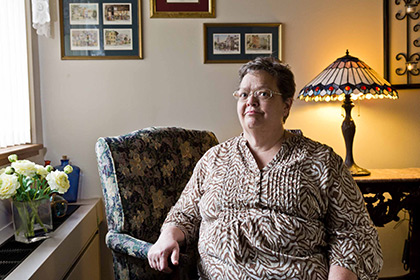AARP Hearing Center

By Holly Fisher
Susan Rogers, 59, has high blood pressure, diabetes and other medical conditions. Her back problems made it difficult to sit all day at her full-time medical records job, and she lost it last year.
Rogers was eventually approved for Social Security disability but doesn’t have enough money to buy a private health insurance plan. And she won’t be eligible for Medicare disability coverage until next November.
“In the meantime, I’m playing Russian roulette with my health,” she said. “I haven’t been to a regular family doctor in over a year, and the last time I was there, I paid cash for the office visit. The doctor said she would work something out, but I was too embarrassed to ask. I didn’t want to run myself into debt and owe her a lot of money.”
While Rogers waits to go on Medicare disability, she’s receiving medical care at a free clinic run by a church in Summerville.
Not poor enough for help
One of South Carolina’s Medicaid programs covers individuals who are aged, blind or disabled, but it is not available to individuals with income above the federal poverty level—$11,490. Rogers’ disability checks made her income too high to qualify.
If South Carolina had opted to expand the Medicaid program this year as provided under the federal Affordable Care Act (ACA)—which would have covered individuals with income up to $15,856—Rogers would have been covered. Under the ACA, the federal government covers 100 percent of Medicaid expansion costs until 2017, and will phase down to 90 percent by 2020 and remain at that level from then on. Participating states pay the remaining percentage.
South Carolina is one of 26 states not expanding Medicaid. Opponents, led by Gov. Nikki Haley (R), object to the state liability.
Tony Keck, state director of Health and Human Services, said the state faces a balancing act of paying for Medicaid along with other health care needs.
“A lot of … other things contribute more to the overall health than giving somebody a Medicaid card and hoping they get healthy,” Keck said, adding that his office is helping people most in need of health care services.
For example, the state is working with hospitals to identify those who are chronically ill and rely on emergency rooms for care. Using Medicaid-funded cooperative agreements, the hospitals refer people to community free clinics or health resources that primarily serve low-income or uninsured patients.
Those efforts aren’t going to immediately help the 200,000 state residents who fall into a coverage gap. According to an analysis by the AARP Public Policy Institute, that includes roughly 51,000 people ages 50 to 64.
“Lots of folks are too rich for Medicaid, too poor for the [insurance] marketplace and just left out of coverage because we decided not to expand Medicaid,” said Rozalynn Goodwin, director of policy research for the South Carolina Hospital Association.
AARP South Carolina will continue its ACA education efforts—which include a discussion on Medicaid—through March, said state director Teresa Arnold. Her hope is that people, including state legislators, will begin to see what’s good in the ACA and give Medicaid expansion a second look.
“We’ll be fighting to expand Medicaid because we want everyone to have access to affordable health care,” she said.
Holly Fisher is a writer living in Charleston, S.C.































































